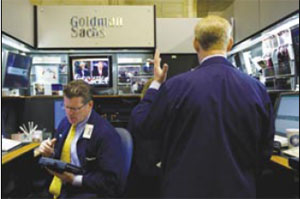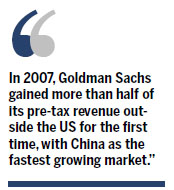Investment
A predator lurks in US, and in China
By Jiang Yong
Updated: 2010-08-10 16:21
 |
Large Medium Small |
|
 Traders work in the Goldman Sachs booth on the floor of the New York Stock Exchange. Jin Lee / bloomberg News |
BEIJING - Investment banks such as Goldman Sachs are the major tools of the United States' financial hegemony.
These specters of the international financial market appeared not only in the US subprime mortgage crisis and the Greece's debt crisis, but also in emerging markets, especially in China.
Goldman Sachs has been active in the Chinese market since 1994. It has created a monopoly on profits, controlled major industries, and also misadvised governments and enterprises in economic decision-making. It is suspected of endangering the safety of China's economy.
Goldman Sachs was a late arrival in the Chinese market. Japan's Nomura Securities began to develop its business in China in 1973. JPMorgan set up a representative office in Beijing in 1980.
Although Goldman Sachs set up its Asia-Pacific regional headquarters in Hong Kong in 1984, it was not until 1994 that it set up offices in Beijing and Shanghai, representing the formal entry into the mainland market.
However, after its entry into the Chinese market, it spent a lot of time, effort and capital on relationships with senior government officials and executives of State-owned enterprises. This is the main reason why Goldman Sachs raced ahead of others.
In 2007, Goldman Sachs gained more than half of its pre-tax revenue outside the US for the first time, with China as the fastest growing market.
Goldman Sachs operates in China in a mysterious way as it does in the US. The low degree of transparency in the Chinese market was originally conceived as the biggest obstacle to the multinational capital. However, through localization strategies, Goldman Sachs gained more "disguises" and "development space" by opacity.
First, it entered the Chinese securities market through a legal loophole.

In December 2004, the China Securities Regulatory Commission approved the joint venture of Goldman Sachs Gao Hua Securities Company Ltd, which was set up together by Goldman Sachs and Beijing Gao Hua Securities Company Ltd. Goldman Sachs entered into the Chinese security market right before the start of a bullish market.
According to a rule enacted in 2002, the total proportion of foreign shareholding or equity participation in foreign securities companies should be no more than one-third. Goldman Sachs owned 33 percent equity of the joint venture and Gao Hua had 67 percent. However, Gao Hua was set up by Goldman Sachs with a $100 million loan, and Lenovo, an important client of Goldman Sachs. The company is basically a front. The fact is that Goldman Sachs holds almost 100 percent of the joint venture.
Second, it entered the Chinese real estate market through an invisible channel.
Since 2003, international speculators were bullish on the renminbi. The pressure on the yuan appreciation was increasing. Thus lots of hot money poured into the Chinese real estate market.
Goldman Sachs did not miss out on this opportunity. At the end of 2005, it injected $22 million to Century 21 China, becoming the second largest shareholder of the real estate agent company.
In 2005, It bought Pidemco Tower (commercial office) from CapitaLand Limited with $107.6 million in Shanghai. As the most expensive transaction, that deal directly pushed up real estate prices in Shanghai.
In October 2006, it bought Shanghai Hongqiao Huayuan Hotel for $70 million.
Third, it entered into China's agricultural market through the acquisition of agricultural products processing enterprises.
Besides mature sales channels and brand recognition, Goldman Sachs owns two giant meat-processing enterprises, Shineway Group and Yurun Group.
And it has penetrated into the upstream of the cultivation industry. Goldman Sachs spent hundreds of millions of dollars on the acquisition of more than 10 professional pig-breeding farms in key areas in China.
Some insiders were concerned that, after the occupation of China's soybean and soybean oil, foreign companies would manipulate pig-breeding and pork industry. The risks of food security (mainly corn) should not be neglected.
Fourth, Goldman Sachs obtained important business and strategic information in China by underwriting bonds for leading State-owned enterprises.
At the suggestion of foreign investment banks like Goldman Sachs, many Chinese large enterprises were listed and introduced strategic investments or performed merger and acquisitions in overseas markets.
However, the financing process has to be inspected thoroughly by foreign professional agencies including investment advisory, auditing and rating. Therefore, no secrets could be kept after the service of these foreign agencies.
Goldman Sachs has always played a key role in the process of going global for large enterprises in China. The industries Goldman Sachs has involved with include petroleum, telecommunications, finance, automobile, mass media, pharmaceutical and others.
And all the companies Goldman Sachs has invested in are leading ones. What is more noticeable is that, it is also the economic adviser for several provincial governments. It has provided consulting and underwriting services many times when the Chinese government issued national debts.
Goldman Sachs has a great reputation in the Chinese financial sector, which it has been actively using to make a profit.
It has been good at adapting the most conventional and suitable ways to express their demands.
Since its establishment, this financial predator has been haunted by endless scandals and lawsuits.
It adulates China for two reasons, one is for public relations, and the other is for its own interests and to cooperate with US policy toward China.
Besides ingratiation, Goldman Sachs and its analysts have been publishing reports and comments on macro and micro economy of China, influencing government's policy-making.
In some reports, it was quite obvious that it was misleading the government. For instance, it has recently said that the yuan should be one-off revaluated, that capital accounts should be opened as soon as possible, that "direct investment in Hong Kong stocks" could help to solve the problem of excess liquidity, and that hot money is not a big problem for China.
Goldman Sachs' operation in China has already gone far beyond the general practice of an ordinary business organization.
The author is director of the economic security studies center of China Institutes of Contemporary International Relations
For China Daily